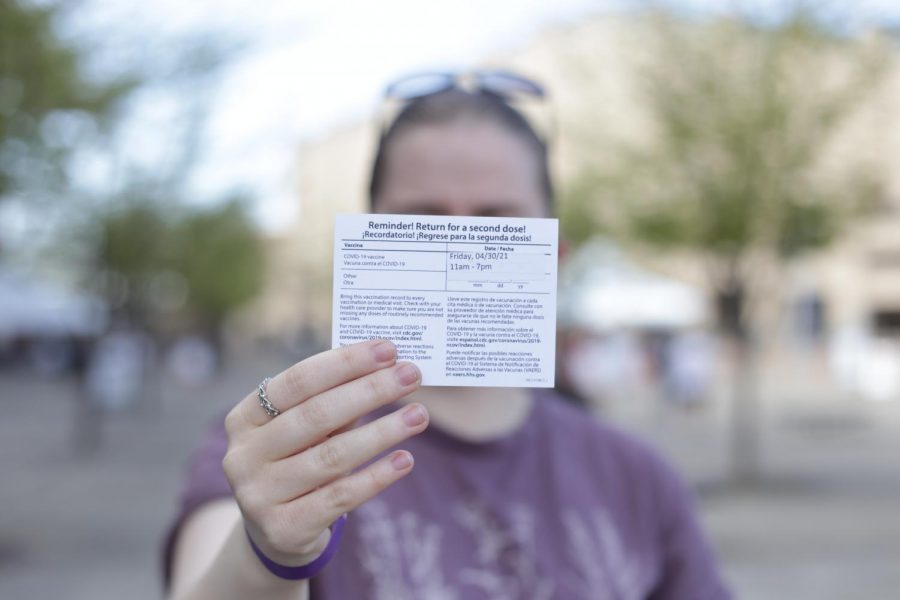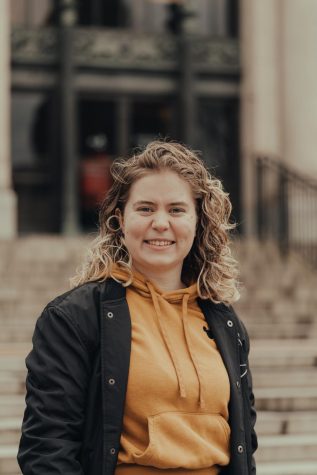COVID-19 vaccination process is ‘very quick and easy’
April 19, 2021
A wide population of Oregon State University students, staff and faculty are now eligible to receive a COVID-19 vaccination and all Oregonians over the age of 16 will be eligible starting April 19.
According to the Oregon Health Authority Vaccine Sequence, anyone included in Group 7 of Phase 1B was to be eligible to receive the vaccine no later than April 5. Group 7 includes, but is not limited to, adults ages 16 to 44 with underlying conditions that put them at risk and frontline workers as defined by the Center for Disease Control.
The CDC defines frontline workers as, “someone who has a job that puts the individual at higher risk for contracting COVID-19 because of: regular close contact with others outside of their household (less than six feet), routine (more than 15 minutes per person) close contact with others outside of their household, and they cannot perform their job duties from home or another setting that limits the close or routine contact outside of their household.”
The CDC’s definition means that many college students who work in retail, at grocery stores or in restaurants are now able to receive the vaccine.
If any OSU community member is unsure if they are eligible to receive the vaccine, they can use the Getvaccinated web tool to check their eligibility.
“This tool will tell you if you meet current statewide vaccine eligibility criteria,” Jenny Haubenreiser, associate vice provost for Student Affairs and executive director of Student Health Services said via email. “It also enables you to set up text or email notifications to learn when you become eligible at the state level.”
OSU community members, who live both within and outside of Benton County and are eligible to receive the vaccine, can schedule an appointment several different ways. COVID-19 vaccines are free to everyone.
“I recommend that students in Benton County visit Benton County’s website to schedule an appointment,” Dan Larson, vice provost for Student Affairs and OSU Coronavirus Response Coordinator said via email. “For students outside of Benton County, I would suggest starting with OHA’s website to find where to get a vaccine in Oregon.”
Samaritan Health Services is also vaccinating hundreds of people daily at Reser Stadium in Corvallis, Ore. and OSU community members can sign up to receive a vaccine there throughThe Samaritan Health website.
Dr. Adam Brady, an infectious disease specialist with Samaritan Health Services and chair of the Samaritan Coronavirus Task Force, also said via email that, “students who are eligible may be vaccinated at Reser Stadium even if they don’t reside in Benton County.”
If an OSU community member chooses to receive a vaccine from Reser Stadium, the process to receive their vaccine will be relatively straightforward.
“You will sign up for a time slot, receive a QR code and other instructions, arrive at the stadium and proceed through the check-in process,” Larson said. “You will then receive the dose and wait 15 minutes for observation. The process is very quick and easy and should take no more than 30 minutes.”
However, community members will have limited choice on which vaccine they receive due to the limited supply of vaccines and how they are distributed.
“Vaccines are allocated to us by the Oregon Health Authority,” Brady said. “We primarily receive Pfizer and Moderna at Reser Stadium and may receive small amounts of Johnson & Johnson as supplies allow. Patients can see which vaccines are available when they schedule [their appointment].”
Community members are encouraged not to let this inability to choose which vaccine they get to stop them from receiving any vaccine.
“The Pfizer and Moderna vaccines are very similar and are both effective,” Haubenreiser said. “People should take whichever vaccine is available to them. It is very important that your second dose is the same vaccine brand as your first dose.”
After receiving the vaccine, someone may experience side effects which, according to Haubenreiser, are natural signs that the body is building immunity.
“Common side effects are: on the arm where you received the shot you may feel pain, aching, redness, swelling for a day or so,” Haubenreiser said. “You also may experience tiredness, headache, muscle pain, chills, fever, and nausea. Any side effects should not last more than a day or so.”
Allergic reactions are also possible and are part of the reason why patients are screened for 15 minutes after receiving the vaccine, but they’re not common.
“Allergic reactions can occur, but they have been extremely rare,” Brady said.
However, on April 12, after 6.8 million doses of the Johnson and Johnson vaccine had been administered in the U.S. thus far, the CDC and the Food and Drug Administration began reviewing the J&J vaccine. Six U.S. cases of rare and severe blood clots were reported in individuals who received this vaccine.
“FDA will review that analysis as it also investigates these cases. Until that process is complete, we are recommending a pause in the use of this vaccine out of an abundance of caution,” according to an FDA statement.
Julia Johnston, an OSU student and employee that works at a lab on campus, has already received a vaccine from the Fred Meyer pharmacy in Corvallis.
“I found [the process] pretty easy…” Johnston said. “I went to the pharmacy, checked in, and then stood in line for about 20 minutes. Then my name was called, and I got my vaccine. I received the Pfizer vaccine.”
According to Johnston, she did experience some side effects the next day that were similar to those that Brady and Haubenreiser said patients may get.
“I was super fatigued and clammy/sweaty,” Johnston said. “I couldn’t do much that next day because I was so tired. It felt like all my energy was zapped out of me. But… I knew that one day of feeling exhausted was nothing compared to catching COVID-19. By the second day, I felt completely fine and have felt so ever since.”
While severe side effects or allergic reactions to the vaccine are not common, if anyone experiences side effects that get worse or don’t go away after a couple of days, they should contact their doctor.
“If the redness or tenderness where you received the shot increases after 24 hours you should contact a medical provider,” Haubenreiser said. “If your side effects are worrying you or do not seem to be going away after a few days, you can call the Student Health Services Nurse Advice Line during regular business hours (541-737-2724), the Oregon call center (dial 211), or the Benton County Health Department call center (541-766-6120).”



















































































![Newspaper clipping from February 25, 1970 in the Daily Barometer showing an article written by Bob Allen, past Barometer Editor. This article was written to spotlight both the student body’s lack of participation with student government at the time in conjunction with their class representatives response. [It’s important to note ASOSU was not structured identically to today’s standards, likely having a president on behalf of each class work together as one entity as opposed to one president representing all classes.]](https://dailybaro.orangemedianetwork.com/wp-content/uploads/2025/03/Screenshot-2025-03-12-1.00.42-PM-e1741811160853.png)
























